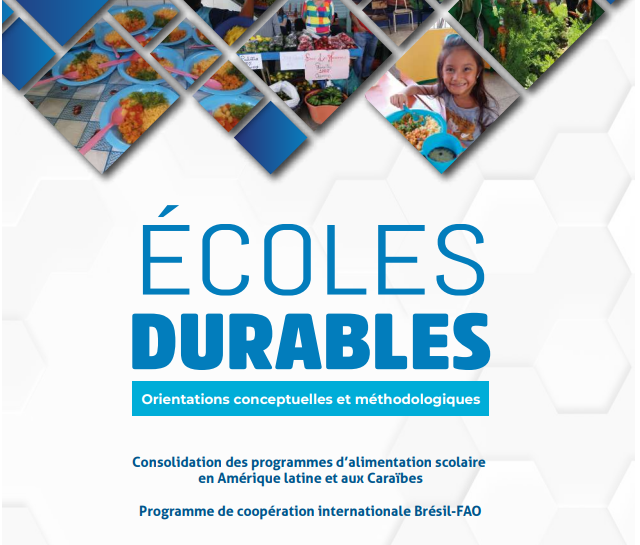This is another important contribution from the Brazil-FAO International Cooperation in school feeding for the countries of the LAC region.
Paulo Beraldo and Palova Brito
Brasilia, January 16, 2024 – To facilitate access for countries and professionals involved in school feeding policy to tools for implementing the Sustainable Schools methodology, the new project Regional School Feeding Agenda, part of the Brazil-FAO International Cooperation Programme, has launched a revised and updated version of the guide ‘Sustainable Schools – conceptual and methodological guidelines’ in two languages: Spanish and French.
The Sustainable Schools methodology, implemented in over 23,000 schools across 13 countries in the region, has already benefited more than 1.6 million students. Since its first version in 2014, the guide has been an important resource for countries to adjust and improve the quality of their school feeding programmes, as well as a pedagogical tool in various courses and training offered by the Brazil-FAO International Cooperation in school feeding to managers and technicians.
The guide provides a history of the methodology’s implementation in various countries, as well as a step-by-step guide to its development: concepts, guidelines, and components of this model that generate knowledge, promote interactions between different levels of government, empower technicians and the school community, and promote the sustainability of an entire national school feeding programme.
Sustainable Schools methodology

Developed in 2012, the methodology integrates the actions of trilateral South-South cooperation jointly developed in the field of school feeding by the Brazilian Cooperation Agency of the Ministry of Foreign Affairs (ABC/MRE), the National Fund for Educational Development (FNDE/MEC), and the Food and Agriculture Organization of the United Nations (FAO).
Based on the premise that schools are privileged spaces of community convergence and that the social and economic development of a city is linked to educational inclusion, the methodology serves as a reference for sustainable school feeding based on six components. These components are developed in schools and municipalities selected by governments, always respecting the reality of each country.
The components include: inter-institutional and inter-sectoral articulation; social and community participation; adequate infrastructure; food and nutritional education with the implementation of school gardens; menus according to nutritional needs and culturally relevant; and public procurement of food from family farming.
“The Sustainable Schools methodology is a strategy used to concretely implement a sustainable school feeding programme in some schools of the country, based on six components. With this methodological experience, the country has the opportunity to learn more about its strengths and challenges. Through this joint development of actions between national, state, and municipal governments, lessons are learned that will allow the scaling of this policy at the national level,” emphasizes Najla Veloso, coordinator of the project Regional Agenda for Sustainable School Feeding in Latin America and the Caribbean.






